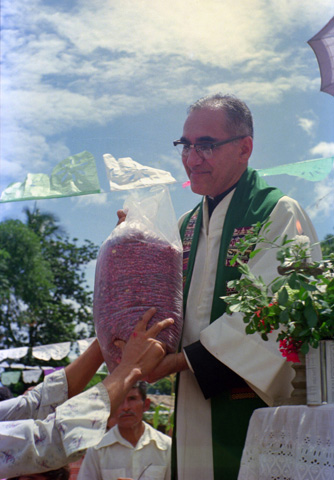
Archbishop Oscar Romero receives a sack of beans from parishioners following Mass outside of the church in San Antonio Los Ranchos in Chalatenango, El Salvador, in 1979. (CNS/Octavio Duran)
Pope Francis formally declared Tuesday that Salvadoran Archbishop Oscar Romero was assassinated as a martyr for the Catholic faith, and the beatification of the prelate who was shot dead after radically calling on the church to stand with the poor is expected within months.
While the Vatican has not announced the date for the beatification -- the last step before sainthood for the Salvadoran archbishop -- it did say Tuesday that there would be a press briefing on the matter Wednesday with Archbishop Vincenzo Paglia, a Vatican official who is leading Romero's sainthood cause.
Francis' declaration of martyrdom, announced in a separate note from the Vatican Tuesday, affirms earlier reports last month that a commission of Vatican theologians had formally declared Romero a martyr, stating that the archbishop was killed in odium fidei, Latin for "in hatred of the faith."
The note from the Vatican on the matter was typically brief, saying Francis had authorized the Congregation for the Causes of the Saints to promulgate a decree of: "The martyrdom of Servant of God Oscar Arnolfo Romero Galdámez, Archbishop of San Salvador ... killed, in hatred of the faith, March 24, 1980, in San Salvador."
Francis' declaration Tuesday essentially clears the way for Romero's beatification. While such recognition normally requires that a miracle be proven to have been caused by the deceased person, martyrs of the faith do not have to meet that requirement.
Although it is unknown what Paglia will announce at the briefing Wednesday, he could very likely provide full details of a beatification ceremony for Romero, which in all likelihood would take place in San Salvador.
Asked on the papal plane traveling home to Rome from Manila, Philippines, Jan. 19 if he might travel to El Salvador to celebrate Romero's beatification himself, Francis said he would not but joked that "there will be a war" between Paglia and Cardinal Angelo Amato, the prelate who leads the Vatican's saints congregation, over who celebrates the ceremony.
Francis made the declaration of Romero's martyrdom Tuesday during a meeting with Amato in which the pontiff also approved martyrdom decrees for three priests killed in Peru in 1991 and a decree of heroic virtue for an Italian priest who died in 1941.
Some had speculated that the lingering nature of Romero's cause was due to unease among church prelates -- including Popes John Paul II and Benedict XVI -- because of Romero's embrace of liberation theology, a type of Christian theology that posits that Christ did not just seek liberation from sin but every type of oppression.
Pope Francis, the first Latin American pope, has seemingly revived Romero's sainthood process.
One month after Francis' March 2013 election, Francis had a meeting with Paglia, who also leads the Pontifical Council for the Family. Coming out of the meeting, Paglia said the pope had told him the process to eventually canonize Romeo had been "unblocked."
Francis said the Vatican's Congregation for the Doctrine of the Faith had blocked Romero's cause for "prudential reasons," responding to a question on the papal plane back from his trip to South Korea in August.
"Now it is unblocked." Francis said then. "Right now the postulators have to move forward because there are no obstacles."
Romero, who was appointed as the archbishop of San Salvador by Pope Paul VI in 1977, was killed in 1980 one day after he had given a sermon calling on soldiers in his country to stop enforcing his government's policies of oppression and violations of human rights.
The archbishop spoke out frequently against the government of the time. He also wrote a letter to U.S. President Jimmy Carter a month before his murder, criticizing the president's decision to recognize the government and to send military aid.
Recognition of Romero's martyrdom could have wider consequences for other sainthood causes as well.
Francis said on the Korean papal flight that one of the questions the Vatican congregation faced was whether such hatred could be proven only against a person's belief or also against the good works the person did because of their belief.
"What I would like is a clarification about martyrdom in odium fidei, whether it can occur either for having confessed the Creed or for having done the works which Jesus commands with regard to one's neighbor," Francis said. "And this is a task for the theologians. They are studying it."
"Because after [Romero] there is Rutilio Grande, and there are others too; there are others who were killed," said Francis, referring specifically to a Salvadoran Jesuit who was killed in 1977 for helping impoverished people in the country organize.
While it is unknown if Romero's finding of martyrdom was made in reference to his belief or his works, Francis Tuesday may have cleared the way for sainthood causes for Grande and others in their recognition of the archbishop.
[Joshua J. McElwee is NCR Vatican correspondent. His email address is jmcelwee@ncronline.org. Follow him on Twitter: @joshjmac.]


